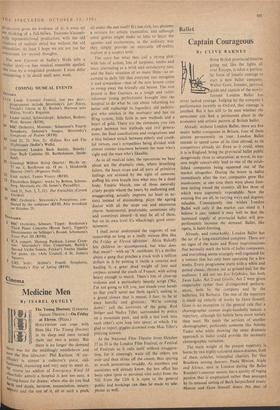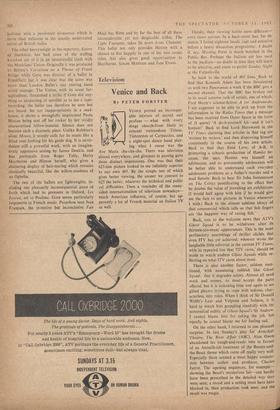Ballet
Captain Courageous
By CLIVE BARNES Already, without London Ballet, there are five major ballet companies in Britain, four of them almost permanently on tour. London Ballet intends to spend some of its time abroad, as its competitors already do. Even so it could, when it is in England, bring the provincial ballet public dangerously close to saturation; at worst, its suc- cess might conceivably lead to one of the estab- lished companies being squeezed out of the market altogether. During the boom in ballet immediately after the war, companies grew like mushrooms; at one time there were about four- teen tatting round the country, all but three of which were supremely expendable. Now the existing five are all, in varying ways and degrees, valuable. Consequently One wishes London Ballet well only if the market can stand it. I believe it can; indeed it may well be that the increased supply of provincial ballet will pro- portionately increase the demand. Ballet, like opera, is habit-forming.
Already, and remarkably, London Ballet has the air of a long-established company. There are no signs of the haste and flimsy improvisations that normally mark the birth of ballet companies, and everything seems strangely well-regulated for a venture that has only been operating for a few weeks. Every programme starts with a white and potted classic, thrown out as ground-bait for the audience. I did not see Les Sylphides, but both Swan Lake, Act 2 and Giselle, Act 2 were given respectable rather than distinguished perform- ances, both by the company and by the ballerina, Jill Bathurst. The rest of the repertory is made up entirely of works by Gore himself. Gore is no exception to the general rule that a choreographer cannot single-handedly sustain a repertory, although his ballets have more variety than most. He needs the services of another choreographer, preferably someone like Antony Tudor who while showing the same dramatic approach to ballet could provide the necessary choreographic variation.
The main weight of the present repertory is borne by two highly-coloured dance-dramas, both of them vehicles, triumphal chariots, for that Boadicea among dancers, Paula Hinton. Night and Silence, seen in London during the Ballet Rambert's summer season, has a quality of raging passion that is emphasised rather than assuaged by its unusual setting of Bach harpsichord music. Hinton and Gore himself dance this duet of
jealousy with a passionate eloquence which is more than welcome in the usually understated idiom of British ballet.
The other heavyweight in the repertory, Eaters of Darkness, has had some of the stuffing knocked out of it in an unsuccessful clash with the Musicians' Union. Originally it was produced to Britten's Variations on a Theme of Frank Bridge while Gore was director of a ballet in Frankfurt; but it was clear that the score was more than London Ballet's tiny touring band could manage. The Union, with its usual far- sightedness, threatened a strike if Gore did any- thing so unsporting or sensible as to use a tape- recording; the ballet can therefore be seen but not heard. Set not inappropriately in a mad- house, it shows a wrongfully imprisoned Paula Hinton being sent off her rocker by her vividly characterised fellow-inmates. Silence does not become such a dramatic piece. Unlike Robbins's silent Moves, it mutely calls for its music like a blind man looking for his guide dog. It is never- theless still a powerful work, with an imagina- tively oppressive setting by James Deakin, and fine portrayals from Roger Tully, Harry Haythorne and Hinton herself, who gives a shattering display of hair-tearing which remains classically beautiful, like the willow-madness of an Ophelia.
The rest of the ballets are lightweights, in- cluding one pleasantly inconsequential piece of froth which had its premiere in Oxford, Les Joyeux, set to Poulenc. Gore seems particularly responsive to French music. Peepshow uses Jean Francaix, the inventive but inconclusive Fair Maid has Bizet and by far the best of all these inconsiderable yet not despicable trifles, The Light Fantastic, takes its score from Chabnler. This ballet not only provides Hinton with a chance to fizz happily in one of her rare comic roles, but also gives good opportunities to Haythorne, Simon Mottram and Jane Evans.







































 Previous page
Previous page